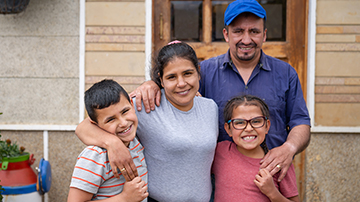The Physicians Foundation grant will fund study of AI impact on physician wellbeing
Providence philanthropy is pleased to announce it has been awarded a $100,000 grant from The Physicians Foundation.
The site navigation utilizes arrow, enter, escape, and space bar key commands. Left and right arrows move across top level links and expand / close menus in sub levels. Up and Down arrows will open main level menus and toggle through sub tier links. Enter and space open menus and escape closes them as well. Tab will move on to the next part of the site rather than go through menu items.
Providence National Foundation harnesses the power of philanthropy to help solve some of our nation’s most complex and systemic health issues—to propel meaningful progress toward making world-class health services accessible for all.
Providence believes health is a human right and recognizes that long-standing inequities and social determinants have led to health disparities in our diverse communities. Our donors share this belief and see innovation and research as catalysts to clinical excellence. They know that world-class caregivers, who represent and understand the patients they serve, can offer better patient care. And they know that mental health and wellness are essential for every person to live their healthiest life.
If these issues are also important to you, we invite you to join us. With your philanthropy, together we can positively impact the health of our communities for generations to come.

Laurie C. Kelley
Chief Philanthropy Officer
“Donor investment in Providence strengthens our ability to improve the health of our nation, providing services and programs that positively impact the lives of millions of people in our care by helping them heal and live well.”
— Rod Hochman M.D., President & CEO, Providence
The National Foundation features a Board of Directors comprised of some of the nation’s most well-regarded thought leaders and doers along with Providence’s top executive leaders and industry experts.
Your generosity can change the future of health.
Every day, your donations create progress toward a healthier tomorrow for people in our communities.
Your investment can make an immediate and long-lasting impact. With you, Providence can respond to today’s most pressing community health care needs and develop solutions to address long-term, complex challenges—to provide care that values and nurtures every person.
Below are the current National Foundation funding priorities. If there are other areas where you’d like to create impact or ways you’d like to contribute, please reach out to Laurie Kelley, Chief Philanthropy Officer, to explore opportunities. Thank you for your generous consideration.
Providence philanthropy is pleased to announce it has been awarded a $100,000 grant from The Physicians Foundation.
The Providence Cancer Institute of Oregon is one of only four locations worldwide recruiting patients with advanced solid tumors of any type that have relapsed or are unresponsive to treatment for a phase I dose-escalation study of IO-108 as a monotherapy and in combination with pembrolizumab, an immunotherapy.
Eric Tran, Ph.D., Assistant Member, Adoptive Cell Therapy Laboratory, at the Providence Cancer Institute’s Earle A. Chiles Research Institute, and his team are pioneering breakthroughs in cancer immunotherapy, a “global first” in tumor reduction efforts. The work infuses reprogrammed T-cells to target cancerous cells and remove them from the body. It shows that our immune system is capable of curing advanced cancer.
Middle schoolers in Lubbock, Texas, participated in Covenant Ready Summer Camps, learning about health care careers such as first responder, nurses, pharmacists and physical therapists. The more than 230 students were excited to get hands-on experience and explore the health care field.
Providence and Premier have invested in CommonSpirit’s workforce development platform, bringing together two top nonprofit health systems and a top health care group purchasing company to partner in developing a stronger platform for expert-driven education to create a more resilient workforce. This comes after a costly exodus of health care workers from the clinical setting since 2020.
Providence supported program, The Community Health Worker Academy takes a new approach to promote health equity by placing community health workers in Southern California in urban clinical settings and training them to assist patients in addressing social determinants that impact health outcomes.
Billie Henderson has lived with depression, anxiety and anorexia. Now she’s offering her experience as a way to help others in a new documentary produced by Ken Burns. In “Hiding in Plain Sight: Youth Mental Illness,” Henderson and 20+ youth describe their symptoms of the mental illness and the impact of social media, childhood trauma and stigma.
At Oregon’s Providence Cancer Institute, researcher Eric Tran genetically engineered T cells to spot a mutant protein hidden inside tumor cells—and only there, not in healthy cells. In this novel experiment, a woman with advanced pancreatic cancer saw her tumors dramatically shrink after her own immune cells were turbocharged, highlighting a possible new way to someday treat a variety of cancers.
In 2022, Providence Oregon launched the forensic nurse examiner program that expands the role of our sexual assault nurse examiners who respond when patients need support, compassion and expertise at our facilities. The job is complex, but the objective is clear: Care for patients experiencing unspeakable trauma, while also working to make sure others don’t have to go through similar pain.
Originally from Uganda, Sharitah Nanono came to the U.S. in search of a better life and joined Providence as an environmental services technician. She is now a certified nursing assistant, thanks to Providence’s tuition reimbursement program for caregivers. Watch her inspiring story.
Community health workers are trusted, front-line public health care workers who serve as a vital bridge between the community and the health care system. They understand local cultural differences, respond to pressing health need, and foster strong relationships with community members, helping people navigate complex systems, reducing health inequities and providing cost-effective care close to home.
Rod Hochman, M.D., president and CEO of Providence, shares an update about the decision to strategically pivot and focus Well Being Trust’s efforts and resources on improving the mental health and well-being of communities within the Providence footprint of Alaska, California, Montana, New Mexico, Oregon, Texas and Washington.
This Catholic Health World article features interviews with two members of Work2BeWell’s national student advisory council as well as co-founders, Dr. Robin Henderson, chief executive for behavioral health at Providence Oregon and chief clinical officer of Work2BeWell, and Mary Renouf, vice president of clinical and consumer communication for Providence.
Adding an immunotherapy pill to standard pre-surgery treatment of colorectal cancer patients doubled the successful outcomes in a Providence Cancer Institute phase II clinical trial, with tumors shrinking significantly or completely, allowing medical management rather than surgery. Read about the study published in The Lancet Oncology.
The Geno4ME (Genomic Medicine for Everyone) study reflects Providence’s belief that genomic medicine will transform the future of health care. The goal of Geno4ME is to increase the role of genetic information in improving disease prevention and treatment. It’s a holistic, 360-approach to care, providing pathways for care integration. The study conscientiously engages underserved communities across Providence to improve health outcomes and equity.
Blockchain can speed up time-consuming administrative processes. In 2021, 16 of Providence’s hospitals and four clinics across Washington, Montana and Oregon were using its shared ledger to speed up prior authorization processing time from days to hours.
Member organizations, including Providence, will offer recommendations and education on the responsible use of artificial intelligence and leveraging technologies for health equity and workforce transformation.
/community-health-workers.jpg?sfvrsn=506df549_1)




